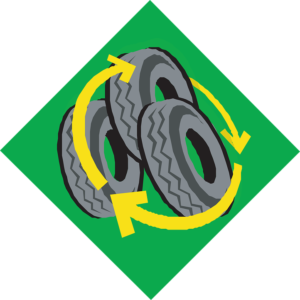The Benefits of Tire Recycling

Improper tire disposal crates various health and safety problems. Fires can start in tire piles, releasing chemicals into the air and ground, and requiring millions of dollars to take care of. Tire dumps also become breeding grounds for vermin and mosquitoes, both of which cause diseases. Additionally, illegal tire dumping can pollute streams, woods, roadsides and other public land.
Fortunately, the tire recycling industry has grown over the last few decades. This is good news for both those who want to get rid of tires and the environment.
Myths About Recycling Tires
It’s time consuming
Recycling tires takes the same amount of time it takes to buy a new set of tires. If you aren’t changing tires on your vehicle but happen to have old tires on your property, you need to find a place where they can be properly recycled. Online research will make this easier and quicker.
It’s messy
Contrary to bottles and cans, tires aren’t taken to recycling centers. Sometimes tires will be picked up on community cleanup days, along with batteries, computers and other items. Many recycling companies accept tires from the public, but this not usually how tires are recycled. If a center requires you to clean your tires before dropping them off, it might get a little messy as you clean off dirt and debris. Find companies who will take tires as they are and spare the mess.
It’s expensive
Recycling fees for tires aren’t expensive. They vary from state-to-state, but usually range between $1 and $2.50 per tire, which a fraction of the cost you would pay for used replacement tires. Think about how costly it is to the environment when you don’t discard of tires properly. Recycling creates jobs to stimulate the economy, and if you run a trucking fleet operation, recycling tires will appeal to environmentally conscious customers.
Positive Uses for Recycled Tires
- Fuel: Whole and reduced-size scrap tires are burned for fuel. They burn hotter and cleaner than coal, reducing carbon emissions.
- Construction materials: Scrap tires are used for roads and civil engineering projects like sound walls, bridge foundations and landfills.
- Crumb rubber: Finally ground rubber produced from waste tires can be used for vehicle mud guards, floor tires, speed bumps and anti-fatigue mats.
- Remolded tires: Scrap tires can sometimes be remolded with new treads and sidewalls in order to create a cost-effective alternative to new tires. When properly manufactured, remolded tires can withstand daily use and carry similar warranties to brand new tires.


